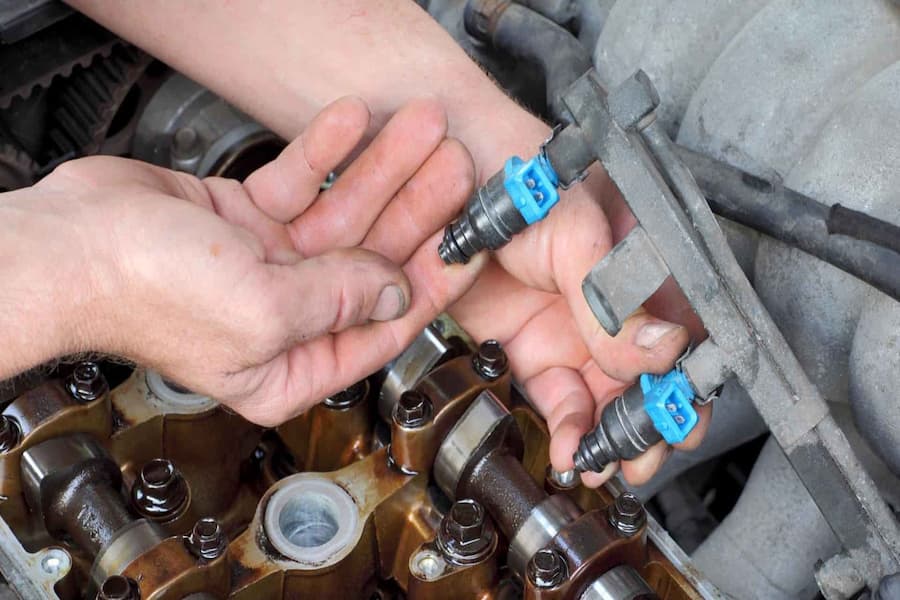Fuel injectors are crucial to automotive performance. These little elements ensure the engine gets enough fuel to burn effectively. They provide the engine with enough fuel and air if it operates properly. If your injectors fail, your automobile may run poorly. Slower speed, misfires, and poor gas efficiency follow. Fuel is wasted when an injector service fails, stopping the burning process. Bad injectors can impact gas efficiency, but this article explains how to fix them.
The Role of Fuel Injectors in Fuel Efficiency
Fuel injectors deliver fuel to engine combustion and function precisely to use the optimum quantity of gasoline. Modern automobiles need injectors for optimal gas economy. Stuck, leaky, or malfunctioning injectors impede this process. Petroleum may come out lumpy or too much. This mismatch causes the engine to use more gasoline than necessary, resulting in poor gas efficiency. Keep injectors clean and operating to save fuel.
Signs of a Bad Fuel Injector
Learn to recognise a faulty injection to save time and money. A reduction in petroleum efficiency is frequent. If you need to refill more often, check your injectors. Misfiring engines, poor running, and a strong gasoline smell are further indicators. The dashboard may have a “check engine” light. These issues can worsen fast and extend to other engine parts. Early detection and repair can improve gas efficiency and save money.
How Clogged Injectors Affect Combustion
A clogged injector prevents gasoline from reaching the engine. This barrier disrupts the air-to-fuel ratio essential for combustion. Fuel is wasted when the engine doesn’t run well without the correct combination. Lost petroleum affects the gas economy and increases harmful emissions. Over time, injector dirt might worsen, making the engine work harder to compensate. For smooth combustion and no clogs, clean injectors regularly.
Leaking Injectors and Fuel Wastage
Leaky petroleum valves reduce gas economy. An injector leak lets gasoline into the engine without necessity. Because these gasoline blocks burn, the engine uses more petroleum than necessary. It can also thin engine oil and accelerate part wear. Leaking injectors reduce gas economy and risk fires. By fixing leaks immediately, you may save petrol and prevent engine damage.
Impact of Dirty Injectors on Engine Performance
Dirty injectors slow engines in several ways. Petroleum deposits can clog injectors, hindering fuel flow. Low petroleum flow causes uneven fuel burning, which can roughen the engine. Up slopes, automobiles may go slower and have less power. Dirty injectors make the engine work harder, using more fuel. Regular injector cleaning improves petroleum flow and mileage.
Misfiring Engines and Poor Mileage
A misfiring engine is an indication of malfunctioning injectors. Misfires occur when the injector doesn’t always provide the engine enough fuel. This mess consumes gasoline and reduces engine efficiency via inefficient combustion. Drivers may experience jerking or hesitation when speeding, which is irritating and dangerous. Misfires stress engine components, speeding wear and tear. Fixing or replacing faulty injectors can reduce misfires and improve gas mileage.
Consequences of Running Rich or Lean
Breaking injectors can make the engine “rich” or “lean.” Running your engine “rich” means too much gasoline and not enough air. Petroleum is wasted, and gas utilization suffers. However, lean implies too much air and not enough gasoline, which can damage the engine. Both conditions waste gas and reduce engine efficiency. Proper injectors maintain the optimum air-fuel combination, improving gas efficiency and engine health.
The Role of Injector Timing
The engine’s performance depends on injector timing. Incorrect injector timing can cause gasoline to be given too early or late. This improper timing alters fuel combustion, slowing speed and increasing petroleum usage. Modern automobiles have intricate injector timing systems, yet a defective injector may ruin them. Regular maintenance and diagnostics can detect timing issues and ensure injectors operate with the engine.
Importance of Regular Maintenance
Regular maintenance is the best way to avoid injector issues. Cleaning injectors, finding leaks, and fixing worn components can increase gas mileage. Many auto shops clean injectors as part of routine maintenance. Gasoline additives and proper gasoline can also prevent injector deposits. Maintaining injectors may extend engine life and save gas costs.
Long-Term Effects of Ignoring Injector Issues
Unfixed injectors can eventually cause engine issues, including petroleum waste, pollution, and inefficiency. Long-term problems can damage oxygen sensors, catalytic converters, and other engine elements, requiring costly repairs. Ignoring injector issues releases harmful gases into the atmosphere. Fixing these issues early saves money and ensures your automobile works well and lasts.
Conclusion
Injectors are tiny yet vital to your engine. Bad injectors can upset the fuel-air balance, causing poor gas efficiency and performance. Regular maintenance, prompt issue resolution, and high-quality petroleum will keep your injectors in good condition. Detecting injector problems early may save money on petrol, reduce emissions, and improve your driving experience. Injector maintenance benefits the environment and your wallet.
Visit Trendblogs for more informative blogs.


